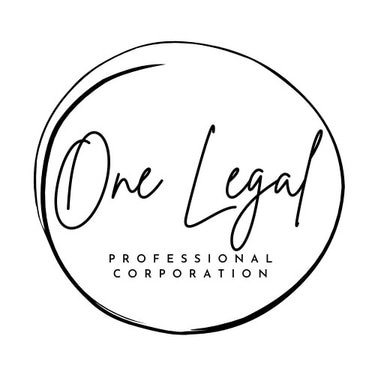Supporting Adult Children with Disabilities: What Canadian Families Need to Know
OneLegal Professional Corporation
6/8/20253 min read


Navigating Support and Parenting Arrangements for Adults with Disabilities in Canada
At OneLegal Professional Corporation, we are often approached by families seeking clarity on their legal obligations towards adult children with disabilities. Parents navigating separation or divorce are especially concerned about how courts treat support obligations and parenting rights when a child, though legally an adult, remains dependent due to a physical or mental disability.
In this blog post, we break down the current legal landscape across Canadian jurisdictions like Ontario and Alberta, providing a roadmap for families facing these complex and emotionally charged issues.
Do Parents Have to Support Their Adult Children with Disabilities?
The short answer: not always—but sometimes, yes.
Canadian courts distinguish between independent adult children and those who are truly unable to support themselves. There is no automatic obligation for parents to continue supporting adult children, even those with disabilities, unless the child can prove they are “unable by reason of mental or physical disability to earn a livelihood.”
In both Alberta and Ontario, the legal test centers on the adult child’s functional ability to be self-supporting. If a disability impairs their ability to work or live independently, courts may require one or both parents to continue providing financial support.
But support isn’t just about income. If a parent is the primary caregiver—managing medical appointments, providing supervision, or assisting with daily activities—that can also justify continued support, even when the child receives government disability benefits like ODSP (Ontario Disability Support Program).
⚖️ Key Case: In Ontario, courts have ruled that ODSP benefits alone do not cancel out a parent's obligation if the child remains dependent for daily caregiving.
Parenting Time and Decision-Making for Adults with Disabilities
Even though a child is legally an adult, parenting time and decision-making responsibility don’t disappear when the child is dependent due to disability.
Under Canada’s Parenting and Support Acts, courts always prioritize the best interests of the child, regardless of their age. That means evaluating not just physical and mental health needs, but also emotional, educational, and social factors.
Only legal guardians can have parenting time and responsibilities. However, courts can split responsibilities—awarding one parent the role of primary caregiver while granting the other decision-making power over financial tools like RESPs and RDSPs (Registered Education or Disability Savings Plans), based on who is best equipped to manage them.
🧩 Example: In Lagtapon v. Lagtapon, the court allowed one parent to manage the child’s day-to-day care, while the other retained control of savings accounts due to stronger financial oversight capabilities.
How Do Government Benefits Impact Child Support?
Many parents assume that once their adult child starts receiving ODSP or other disability benefits, their obligation ends. This is a common myth.
While government subsidies are considered when calculating support, they do not automatically cancel out parental responsibility. Courts conduct a holistic analysis of both the adult child’s needs and the parents’ ability to contribute.
💡 Tip: Parents must disclose their income and assets fully—even if the child receives public support—so that the court can make a fair and informed decision.
Takeaway: Support Is About Needs, Not Just Age
Courts across Canada recognize that adulthood doesn't always equate to independence—especially when disabilities are involved. If your adult child still relies on you for care or financial support due to a disability, you may still have legal obligations, and courts will take these into account during separation or divorce proceedings.
How OneLegal Can Help
At OneLegal Professional Corporation, we understand the sensitive nature of parenting and support matters involving adult children with disabilities. Our family law experts can help you:
Understand your rights and responsibilities as a parent or guardian
Navigate ODSP and other government benefits in the context of child support
Draft customized parenting plans and support agreements that meet your family’s needs
Advocate for your child’s best interests in court or through alternative dispute resolution
📞 Ready to Talk? Let’s Protect What Matters Most.
Whether you're initiating separation, modifying an agreement, or need guidance on supporting a dependent adult child, we're here to help.
👉 Book a free consultation today and speak with a family lawyer who understands your situation.
Let's Connect!
Contact US
info@onelegal.ca
Tel: (416) 380-7501
Fax: (416) 642-9457
The Information on this website is for informational purposes, and should not be construed as legal advice. If you require specific legal advice regarding your family law matter, please contact us to schedule a consultation
Copyright © 2025 OneLegal Professional Corporation
